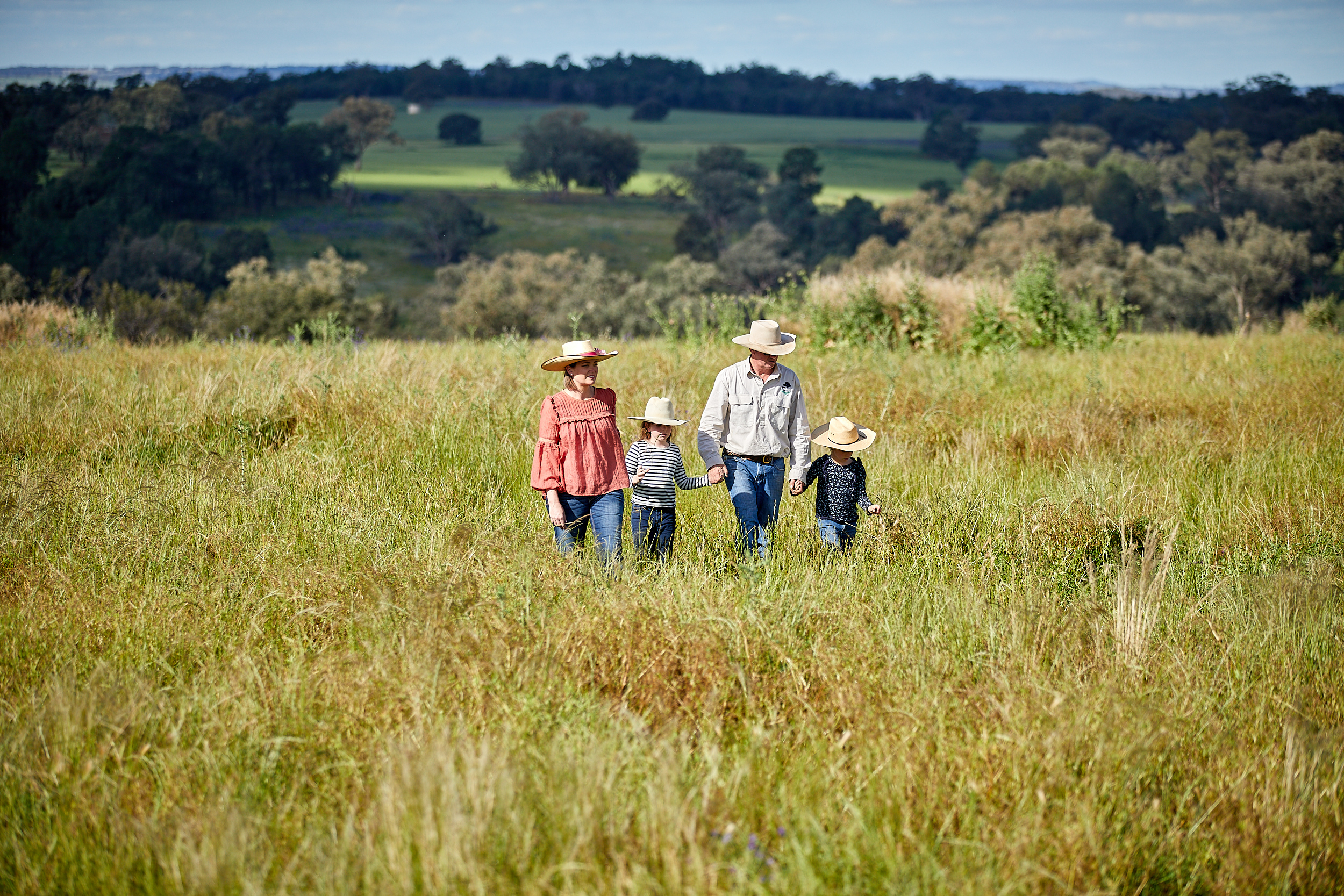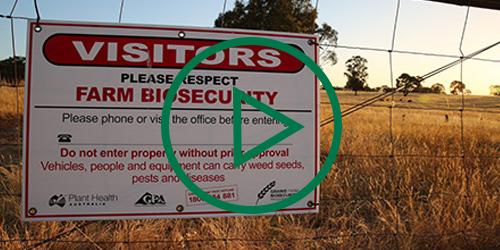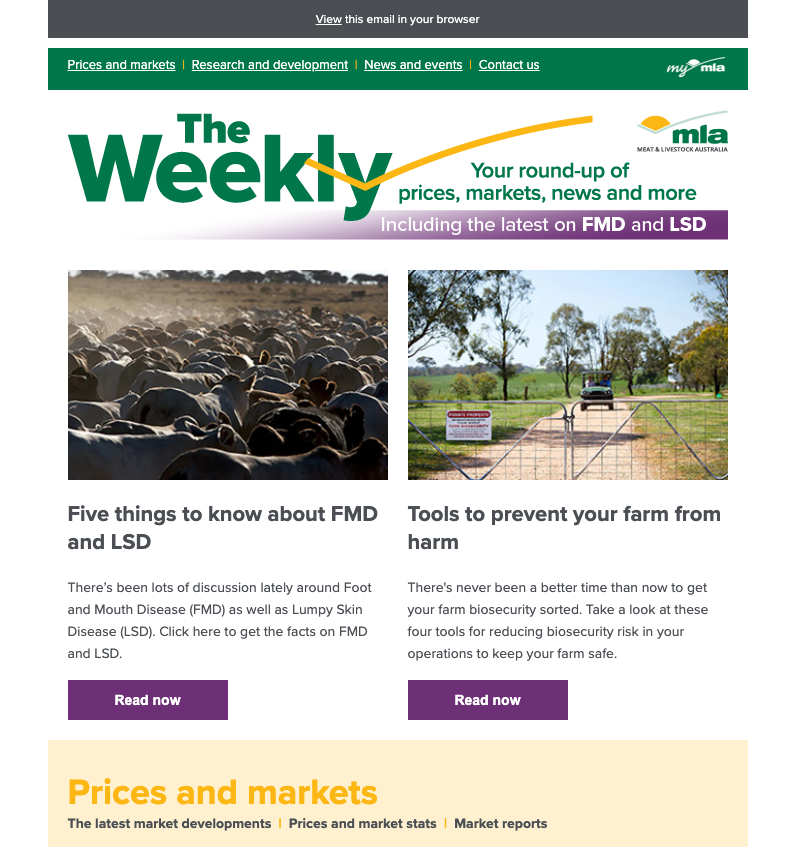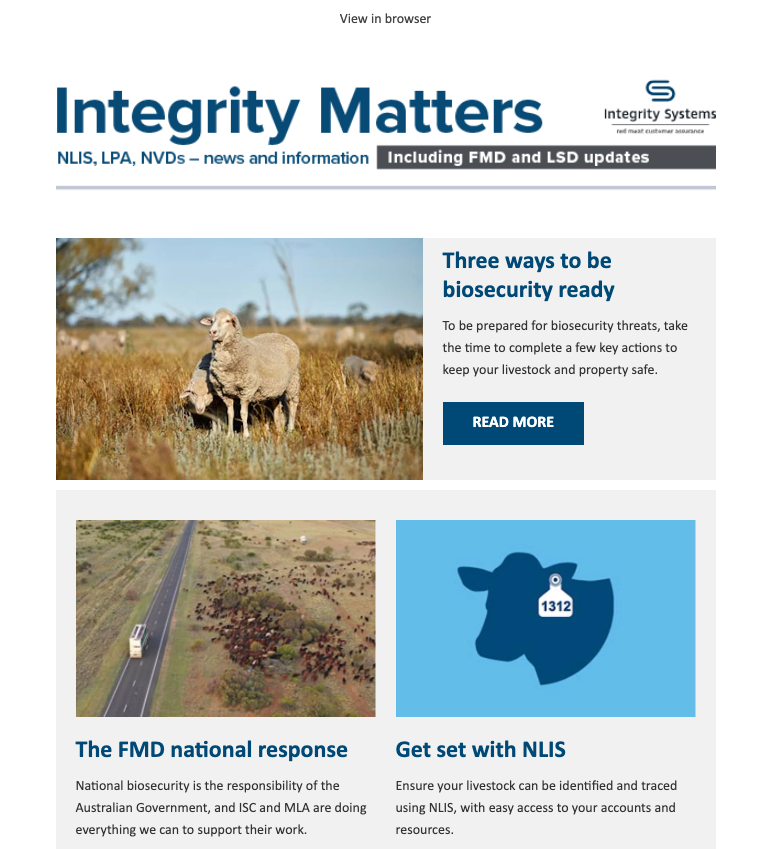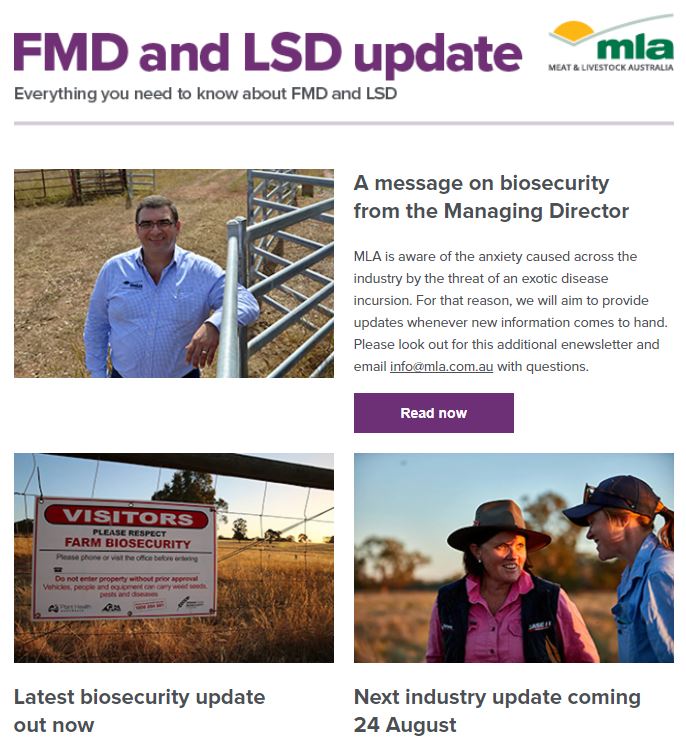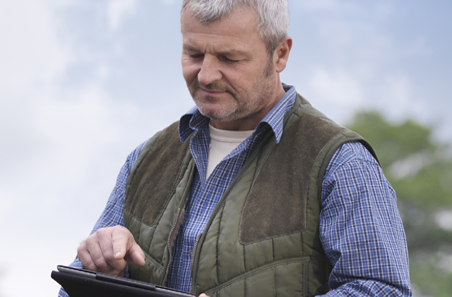
Foot-and-mouth disease (FMD) and lumpy skin disease (LSD)
Foot-and-mouth disease (FMD) and lumpy skin disease (LSD) cases have been confirmed in Indonesia and in July 2022, FMD was also detected in Bali.
Australia is currently free from FMD and LSD and our priority is to keep it that way.
It’s the Australian Government’s responsibility for protecting Australia from these diseases, and the industry is doing everything we can to support their work. We understand Australia’s frontline biosecurity officers are currently operating with increased vigilance across all flights arriving from Indonesia, including Bali.
The risk of these diseases is at the forefront of industry priorities. There is a very clear and robust plan in place. It’s known as the AUSVETPLAN and you can read more about it online here - Emergency response arrangements - Animal Health Australia.
MLA in conjunction with the Australian Government, is working closely with the Indonesian Government and Industry via a biosecurity support program to help control the spread of FMD and LSD in Indonesia.
Should either disease reach Australian shores, there would be a significant impact for our livestock industries, along with substantial trade impacts if Australia was no longer recognised as being free from FMD or LSD.
The cost of a disease incursion would also see severe economic losses to Australia’s agricultural sector.
Detection of lumpy skin disease (LSD) in Australian cattle exported to Indonesia
On the 30 July 2023 the Department of Agriculture, Fisheries and Forestry (DAFF) were advised by the Indonesian Agriculture and Quarantine Agency (IAQA) that lumpy skin disease (LSD) has been detected in a small number of Australian cattle exported to Indonesia—after those cattle had arrived and spent some time in Indonesia. Australia is and remains free from lumpy skin disease, as confirmed by Australia’s Chief Veterinary Officer on 30 July 2023.
Find out more
1. Watch back an industry webinar held on 31 July 2023 with updates from the Chief Veterinary Officer and the Minister for Agriculture in response to Australian cattle testing positive to LSD after spending time in Indonesia.
2. Read this statement provided by the Department of Agriculture, Fisheries and Forestry on the 30 July 2023.
3. Read this joint statement from the Red Meat Advisory Council and the National Farmers’ Federation regarding live cattle exports to Indonesia.
4. Click here to find out what lumpy skin disease is, key facts and what signs to look for in cattle.
MLA’s role
MLA is an active member of the industry taskforce working on planning and preparedness.
MLA’s role as the marketing and research service provider for the red meat industry, is to support the industry taskforce with technical expertise and investment in potential prevention and treatment solutions against both diseases, including mRNA vaccines.
We know that our members’ livelihoods depend on maintaining our disease-free status and it’s the reason we are working tirelessly with industry and government to collectively strengthen our approach to a potential disease outbreak.
Australia’s biosecurity wall
From foot mats to detector dogs, passengers travelling to and from Indonesia are now exposed to more than 20 biosecurity touchpoints to protect Australia from exotic animal diseases. In this video produced in partnership between the Department of Agriculture, Fisheries and Forestry and MLA, industry representatives explain how the measures are working.
Your questions answered
To help Australian producers understand FMD/LSD and their impacts – as well as what’s being done to prevent them from entering Australia – MLA has compiled some FAQs.
Foot and Mouth Disease: FMD is a highly contagious animal disease that affects all cloven-hoofed animals including cattle, sheep, goats, camelids, deer and pigs. Symptoms may include fever, drooling, reluctancy to move and blisters on the mouth, snout, tongue, lips or hooves. For more information, visit Animal Health Australia’s FMD page.
Lumpy Skin Disease: LSD is a contagious viral disease that affects cattle (both beef and dairy) and water buffalo. Symptoms may include discharge from the eyes and nose (usually observed first), decreased milk yield in lactating cattle, high fever, firm skin nodules 2–5cm in diameter, loss of body condition and death. For more information, visit Animal Health Australia’s LSD page.
Foot and Mouth Disease: A 2013 ABARES report estimated an FMD outbreak would result in severe direct economic losses to the livestock and meat processing sector over a ten-year period. These losses ranged up to $52 billion over 10 years at a 7% discount rate.
An update to this estimate conducted in 2022 found the same large multi-state outbreak would now have a direct economic impact of around $80 billion (in 2020–21 dollars and with a 3% discount rate).
Source: Department of Agriculture, Fisheries and Forestry, 2022: FMD consequences
Lumpy Skin Disease: If lumpy skin disease occurred in Australia, the objective would be to eradicate it as quickly as possible. This would involve humane destruction of infected animals, vaccination, the disinfection of infected properties and a vector control program. Australia’s Veterinary Emergency Plan (AUSVETPLAN) contains the nationally agreed approach for the response to an outbreak of lumpy skin disease in Australia.
In the event of an outbreak of lumpy skin disease in Australia, the trade implications would be difficult to predict with certainty as such issues are highly situational and would vary across markets.
If commodities require certification that Australia is free from lumpy skin disease, those exports would be temporarily suspended while health certification requirements are renegotiated.
Source: Department of Agriculture, Fisheries and Forestry, 2022: Lumpy Skin Disease
MLA, in conjunction with the Australian Government, is working closely with the Indonesian Government and industry via a biosecurity support program to help control the spread of FMD and LSD in Indonesia. The program involves on-the-ground support from the Australian red meat industry to improve the Indonesian feedlot sector’s emergency response to these diseases. It will also enable longer term biosecurity capacity of the Indonesian feedlot sector to continue to operate with minimal disruption.
The Red Meat Advisory Council has also activated the red meat and livestock industry’s crisis management process. This led to the formation of a high-level cross-industry taskforce to ensure coordination and collaboration across all affected industry sectors. The taskforce meets weekly and comprises senior representatives from the Red Meat Advisory Council, the National Farmers’ Federation, Australian Dairy Farmers, and their respective industry service providers, including MLA.
MLA plays a key supporting role to the taskforce by providing technical advice via subject matter experts across the following four committees:
- Overseas in-country support – to develop proposals for providing support to Indonesia and other neighbouring countries in their mitigation and management of FMD/LSD and to contribute to proposals for FMD/LSD support in overseas markets put forward by other parties.
- Trade and protocols – to undertake specific market risk analysis and market prioritisation and determine protocol and health certificate needs, both pre-emptive and reactive.
- Domestic containment strategy – to develop effective strategies to inform the containment and management of the spread of FMD/LSD should they arrive in Australia, complementing existing processes and plans, such as AUSVETPLAN, as well as other work being developed. This includes:
- vector control
- containment lines and zoning
- quarantine
- eradication and disposal
- food safety
- transport and movement
- response capacity and capability.
- LSD diagnostic capability and vaccine development – to develop strategies for the development of diagnostic capability and vaccines to diagnose, prevent and manage the spread of LSD, should it arrive in Australia.
Animal Health Australia (AHA) manages Australia’s FMD vaccine bank on behalf of governments and industry. The contract specifies that should doses of the chosen FMD vaccine strain be requested they will be delivered within seven business days. AHA have compiled an extensive list of key questions which explain how Australia may approach an FMD vaccination program. For more information, visit Animal Health Australia’s role of vaccines in Australia’s FMD preparedness page.
What producers can do
All livestock producers can do now is be prepared, vigilant and on the lookout.
Good biosecurity practices and early detection will be essential to reduce the potential impact of FMD or LSD, should either arrive in Australia.
Producers are urged to exercise vigilance on-farm by:
- being aware of the symptoms of FMD and LSD
- calling the Emergency Animal Disease Watch Hotline on 1800 675 888 if you suspect LSD or FMD in your livestock
- adhering to all traceability obligations, including meeting your requirements under the National Livestock Identification System (NLIS) and completing National Vendor Declarations so they are clear, complete and correct.
- reviewing your on-farm biosecurity plan.
Stay informed
Industry news
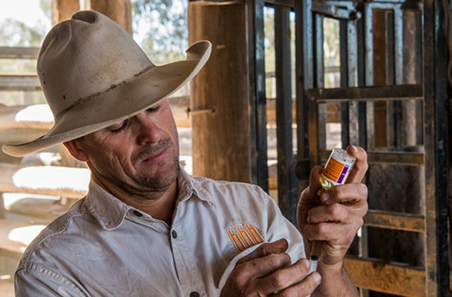
MLA funds mRNA technology project to rapidly produce emergency animal disease vaccines
Meat & Livestock Australia (MLA) has recently funded a project to produce and test mRNA vaccines that can be rapidly mass produced in Australia in the event of a lumpy skin disease (LSD) or other exotic disease outbreak.

FMD vaccination Q&A with MLA’s Indonesian Livestock Services Manager, Helen Fadma
MLA’s Indonesian Livestock Services Manager, Helen Fadma shares her insights on how the MLA-funded FMD vaccination program is progressing.
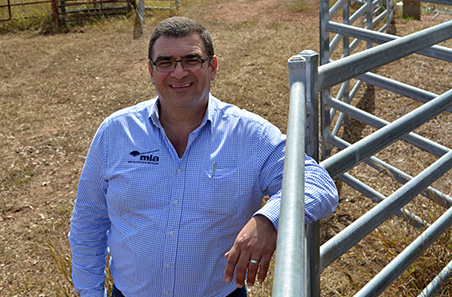
Op-ed - Investing in vaccine development and strategies to protect our industry
At Meat & Livestock Australia (MLA) we have been working to communicate the issue to industry through a range of channels and partnerships, including a series of industry webinars over the last few months.
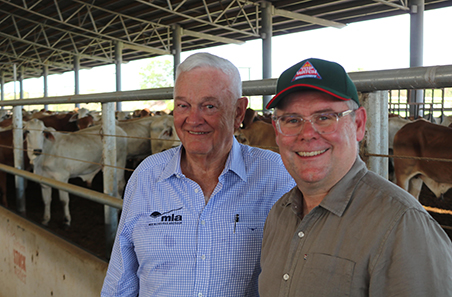
Australia's first National Lumpy Skin Disease Action Plan launched
An Australian-first plan to defend the cattle industry against lumpy skin disease (LSD) was launched in Darwin on 13 October 2022.
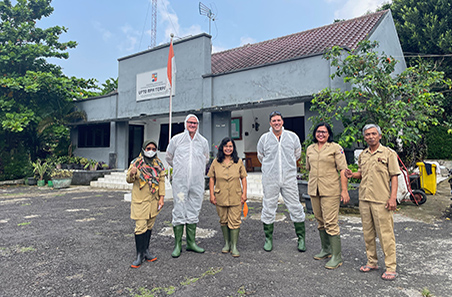
FMD vaccines: what you want to know
Vaccination is one of the methods being used to control the current outbreak of foot-and-mouth disease (FMD) in the Indonesian archipelago.
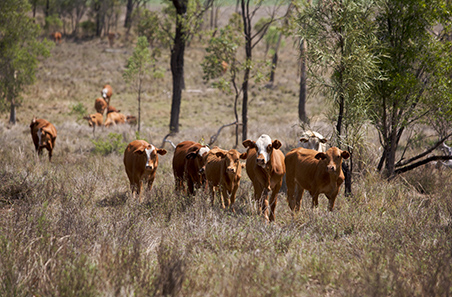
The latest on lumpy skin disease
Lumpy skin disease (LSD) is not present in Australia. However, with the recent detection of the disease in Indonesia, it’s important to know the facts on LSD to keep our industry prepared to prevent the spread of the disease.
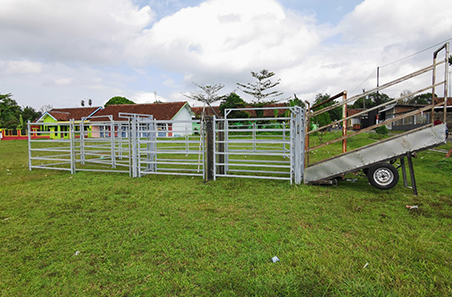
MLA funds portable yards for FMD vaccination in Indonesia
Five sets of portable yards to aid local government authorities in vaccinating cattle for foot-and-mouth disease (FMD) across the Indonesian Archipelago have now been completed thanks to a project funded by Meat & Livestock Australia (MLA).
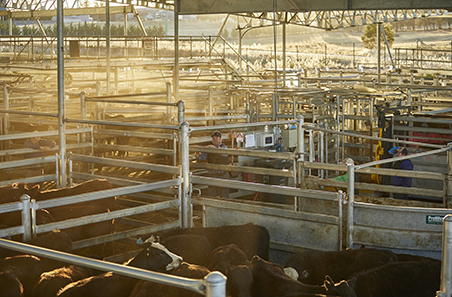
Industry’s plan for managing an animal disease incursion
Australia has a range of detailed response plans and arrangements in place in the event of an incursion of either FMD or LSD into our country. These plans are rehearsed regularly and are continuously reviewed by both government and industry representatives.
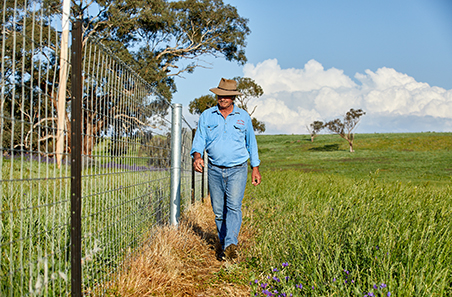
Practical tools to protect your business
Getting on the front foot with farm biosecurity is essential to protecting your livestock and business from the potential impact of disease.
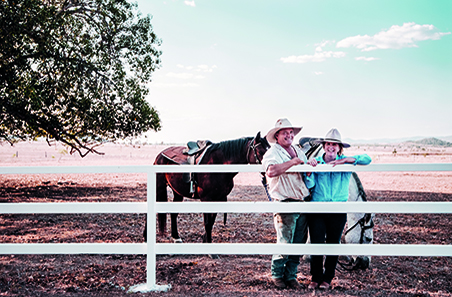
Beefing up your farm biosecurity plan
Melinee and Rob Leather use biosecurity as a tool to protect their own business, as well as contribute to the integrity of the whole industry.
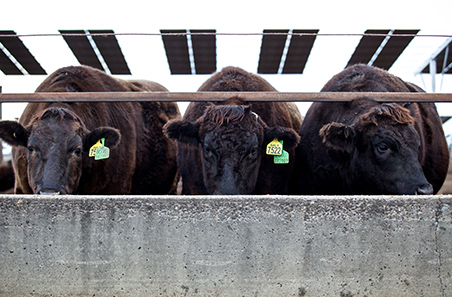
Australian and Indonesian livestock sectors work together to limit disease spread
Australia will work with Indonesian feedlots to help protect their facilities from FMD and LSD through a new project jointly funded by the Australian Government and MLA.

Spreading the word about FMD and LSD
With the recent detection of FMD and LSD in Indonesia, it’s important the whole community plays their part in keeping Australia’s red meat and livestock industry safe.
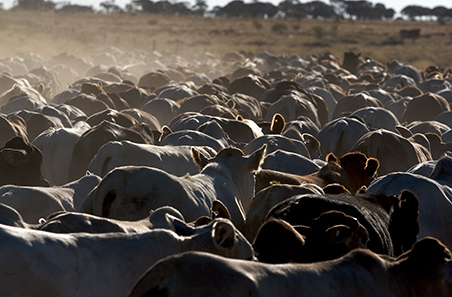
Five things to know about FMD and LSD
There’s been lots of discussion lately around Foot and Mouth Disease (FMD) as well as Lumpy Skin Disease (LSD). Click here to get the facts on FMD and LSD.
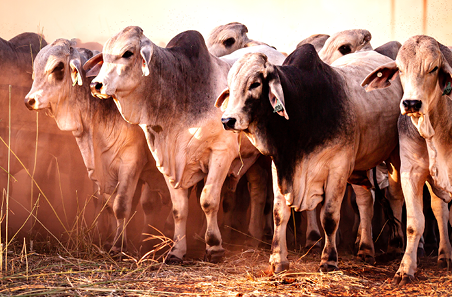
Foot and Mouth Disease: What you need to know
This week, the Australian Government confirmed that cases of Foot and Mouth Disease (FMD) had been detected in Bali, Indonesia. Here's what you need to know.
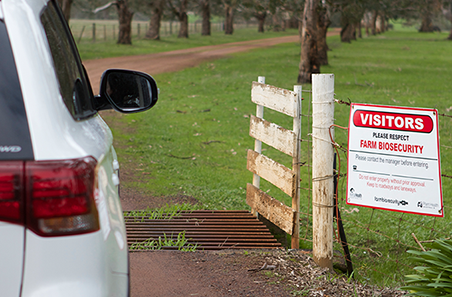
FMD/LSD: Four ways to protect your livestock and livelihood
With the threat of Foot and Mouth Disease (FMD) and Lumpy Skin Disease (LSD) on Australia’s doorstep, here are some practical things you can do on-farm to protect your business.
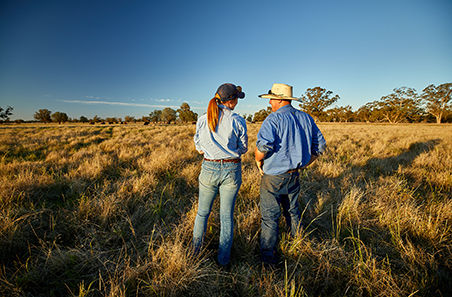
Response to Foot and Mouth Disease (FMD) and Lumpy Skin Disease (LSD)
Preparedness for any biosecurity threat to the red meat and livestock industry is front of mind for MLA. As an organisation, we are doing everything we can to support industry.
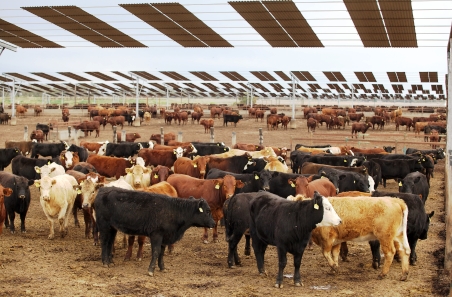
Australian livestock industry provides additional biosecurity support to Indonesia
The Australian livestock industry has invested in additional on-the-ground measures to further support the Indonesian biosecurity response to foot-and-mouth disease (FMD) and lumpy skin disease (LSD).

